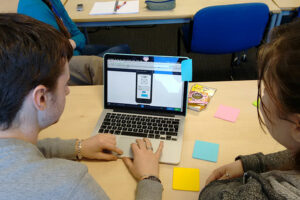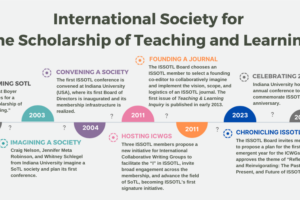Scholarship of Leading (SoL) Special Interest Group (SIG) Meeting Minutes 2018
- Posted by ISSOTL Admin
- Categories News
- Date March 18, 2019
Scholarship of Leading (SoL) Special Interest Group Meeting
ISSOTL Conference 2018, Bergen, Norway
Friday, October 26, 2018
7:30 am – 8:20 am
Attendees:
Elizabeth Bowering, Mount Saint Vincent University
Megan Burnett, University of Toronto (Acting Chair)
Johan Geertsema, National University of Singapore
Chng Huang Hoon, National University of Singapore
Marie Vander Kloet, University of Toronto
- Megan welcomed and opened with overview of SIG’s purpose/focus and current membership levels (201 members)
- 4 other attendees introduced themselves
- reviewed 5 key areas of interest that surfaced through last year’s SIG membership survey: how to change culture through leadership, student engagement In leadership, dimensions/models of leadership, different structures of leadership internationally through teaching centres (centres of support and excellence), collaboration in research
- interest in exploring theory in leadership
- Connection to the forthcoming article by Kenny et al. in IJAD
- a fundamental question: who gets to be leaders and how do they get there?
- Huang Hoon announced goals of ISSOTL Board in encouraging leadership within ISSOTL more broadly; highlighted Board’s particular interest in activating the SIG membership to explore pathways to leadership opportunities in ISSOTL
Discussion (open):
- important questions for SIG to explore:
- how to enable/support leadership development?
- what does educational leadership entail or include?
- are there comparisons to be made between models, and how these models emerge and are supported in different contexts?
- interest in examining educational leadership in undergraduate institutions (especially where there are not graduate programs) – led to discussion of importance of highlighting a broad range of examples of leadership from a range of institutional contexts (research-intensive, undergraduate, vocational, college sector, etc. – this will be important when selecting the leadership cases)
- importance of common language and descriptive categories (Huang Hoon again mentioned the idea of coming up with a common template or taxonomy for educational leadership)
- Johan highlighted confusion in his context between “leadership”, “service” and “management” when faculty try to capture their educational leadership work in teaching portfolios for promotion – noted that faculty in their teaching portfolios/dossiers don’t name work as leadership but instead think of it as service, when in fact the teaching centre would call it leadership
- key questions: what do these activities involve? What can properly be named “leadership”?
- commitment and interest in focusing the SIG on a project – will draw in more members if the SIG can identify key priorities/initiatives that people can contribute to
Discussion of the Fields et al. leadership model:
- Elizabeth asked how do institutions think of pedagogical research in terms of leadership – typically it is linked more to demonstrating excellence in teaching practice
- Megan shares example of UofT teaching stream faculty / SoTL – “educational leadership” is a criterion in promotion guidelines but is not clearly explained
- Johan: the need in the model to distinguish pedagogical research, SoTL research and scholarly teaching (inquiry into practice without the expectation of publishing) – e.g. SoTL could include a focus on workshops, roundtable discussions, mentoring, etc.
- Elizabeth: distinguishing SoTL and pedagogical research – who are experts in education compared to disciplinary experts who are excellent teachers? Would the “r” word (“research”) possibly intimidate excellent teachers who may in fact be doing SoTL but wouldn’t characterize it as “research”?
- how to capture in the model the role of reflective practice and sharing locally, along with a focus on publishing
- Huang Hoon: with regard to the Fields et al. model, would recommend a more explicit focus on SoTL – making “SoTL” more visible in the framework/visual model, not just “pedagogical research”
- challenges of language – people don’t know what SoTL is and feel worried about researching
- “SoTLing/SoTLy” – quotes from Huang Hoon
- influencing as a key element of leadership
- this (Calgary) model seems to focus on individuals, but what about capacity building – what kind of collective influence do individuals have (when it comes to moving SoTL beyond a local context and fostering a SoTL culture in institutions)?
- Johan: research is more seen to drive individual careers (SoTL as linked to personal career advancement) and education is more community-based – so there exists a tension in how to frame scholarship within leadership (when it comes to teaching and learning)
- importance of collective action as a key factor in leadership and capacity-building: how to bring this in to the Calgary model
- role of collective action mentioned in forthcoming IJAD article
- collaboration also a key theme/goal that emerged from last year’s SIG survey
- Huang Hoon: how do we describe/represent the leap from leadership to collaboration?
- what kind of collaboration tends to be valued?
- how do people new to the field and practice of SoTL actually get involved in collaborations – there are many pre-formed collaborations that are well known already in ISSOTL…how to “break in”, widen participation/access?
- Huang Hoon & Johan: the spirit of the “big tent” can sometimes obscure that there are cliques and perhaps hierarchies that already exist and that can make breaking in feel very difficult
- engaging in collaboration – even identifying these opportunities – can be particularly challenging because everyone in ISSOTL is so friendly and yet people can still feel on the outside and unable to collaborate and join in
Discussing the call/template for the leadership cases:
- reviewed Angela Carbone’s example
- timeline: submission by email to Carol or Angela by May 1, 2019 in order to review over the summer
- goal is to compile cases and edit into a document/resource that includes an introduction from Angela/Carol and the research team at Calgary (description of their framework)
- intend to have a shareable document ready before ISSOTL next fall
- Huang Hoon: recommends that the call go out to all ISSOTL members, not just SIG members
- communication with Jessie Moore for the call
- Marie: recommendation to include an additional example from an educator who is either mid-career and/or from a primarily undergraduate university, etc. to showcase people who work in different contexts or are at different career stages
- all others strongly supported the need to be inclusive and representative when selecting cases, and even the case examples – recommended adding a couple of other example cases beyond just Angela’s so that potential contributors could “see themselves” as possible exemplars of leadership
- Johan: interesting side question…how can the case studies approach be used to inform the process of preparing teaching dossiers, or how could these leadership cases inform/build other learning opportunities for teaching faculty how to capture/document/articulate educational leadership? (e.g. leadership cases could feed workshops at the local level in a given institution, or at future ISSOTL conferences; could be used as a learning tool to highlight to faculty how to aim for leadership in practice and capture leadership in dossiers)
You may also like

2024 Emerging Scholars Fund
9 April, 2024

Online Webinar | May 23, 2024
25 March, 2024

Call for ICWG24 Group Participants
8 March, 2024

